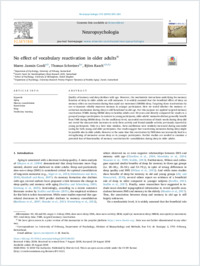No effect of vocabulary reactivation in older adults
- Cordi, Maren J. University of Fribourg, Switzerland
- Schreiner, Thomas Zurich Center for Interdisciplinary Sleep Research (ZiS)
- Rasch, Björn University of Fribourg
-
2018
Published in:
- Neuropsychologia. - 2018, vol. 119, p. 261
English
Quality of memory and sleep declines with age. However, the mechanistic interactions underlying the memory function of sleep in older adults are still unknown. It is widely assumed that the beneficial effect of sleep on memory relies on reactivation during Non-rapid eye movement (NREM) sleep. Targeting these reactivations by cue re-exposure reliably improves memory in younger participants. Here we tested whether the memory reactivation mechanism during sleep is still functional in old age. For this purpose we applied targeted memory reactivation (TMR) during NREM sleep in healthy adults over 60 years and directly compared the results to a group of younger participants. In contrast to young participants, older adults’ memories did not generally benefit from TMR during NREM sleep. On the oscillatory level, successful reactivation of Dutch words during sleep did not reveal the characteristic increases in early theta activity and frontal spindle activity previously reported in young participants. Only in a later time window, theta oscillations were similarly increased during successful cueing for both young and older participants. Our results suggest that reactivating memories during sleep might be possible also in older adults. However at the same time this reactivation by TMR does not necessarily lead to a strengthening of memories across sleep as in younger participants. Further studies are needed to examine a potential loss of functionality of memory reactivation for consolidation during sleep in older adults.
- Faculty
- Faculté des lettres et des sciences humaines
- Department
- Département de Psychologie
- Language
-
- English
- Classification
- Psychology
- License
-
License undefined
- Identifiers
-
- RERO DOC 323253
- DOI 10.1016/j.neuropsychologia.2018.08.021
- Persistent URL
- https://folia.unifr.ch/unifr/documents/306974
Statistics
Document views: 116
File downloads:
- Texte intégral: 262
